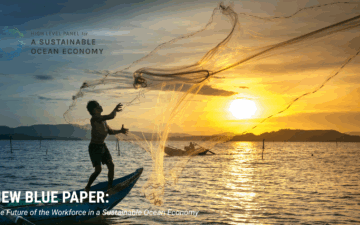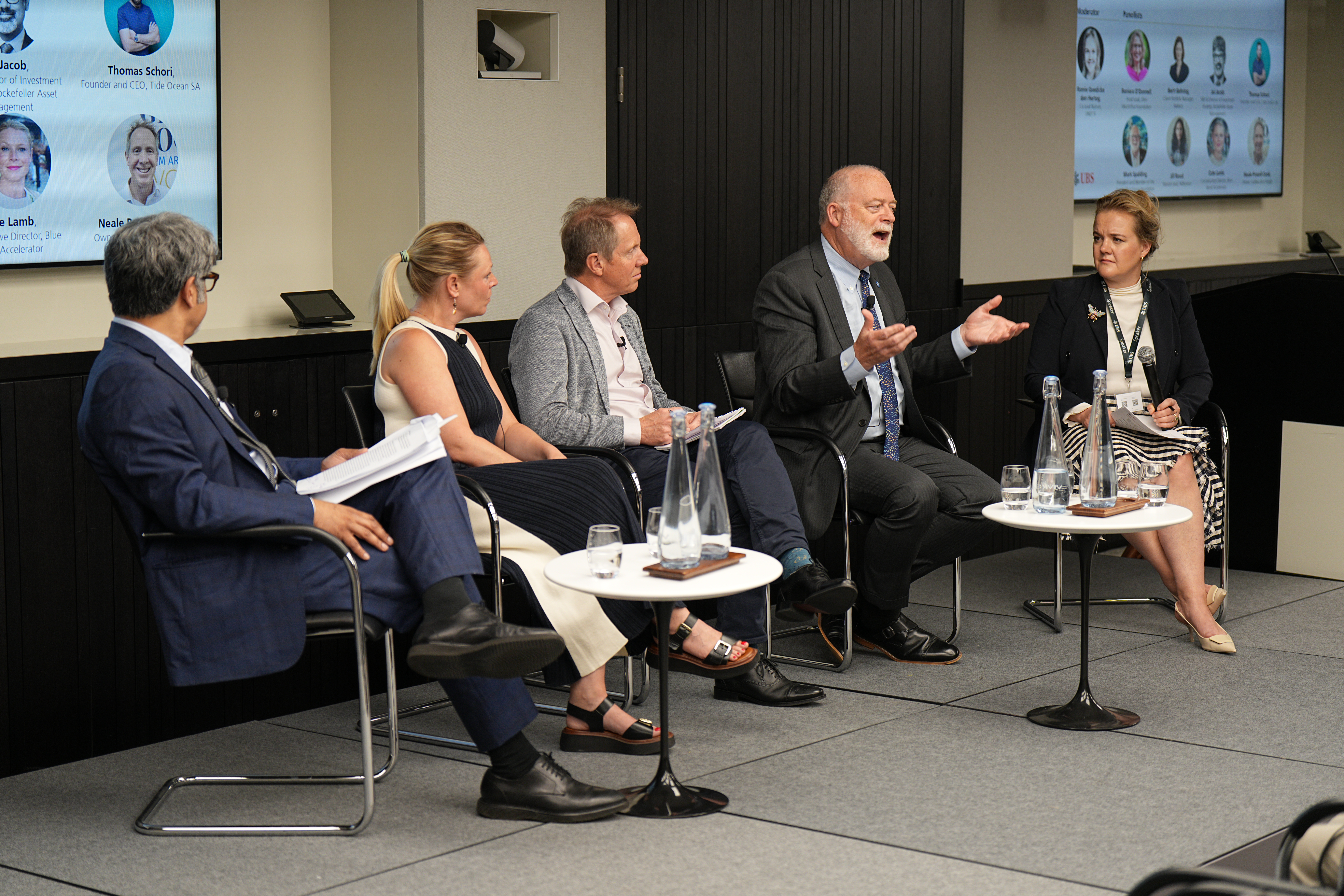Tourism industry leaders, financial sector, NGOs, IGOs and Associations join by taking collective action to achieve a sustainable ocean economy.
Key Points:
- Coastal and marine tourism contributed $1.5 trillion to the Blue Economy in 2016.
- The ocean is critical to tourism, 80% of all tourism takes place in coastal areas.
- Recovery from the COVID-19 pandemic requires a different tourism model for coastal and marine destinations.
- The Tourism Action Coalition for a Sustainable Ocean will serve as a knowledge hub and an action platform to build resilient destinations and strengthen socio-economic benefits of host destinations and communities.
Washington, DC (May 26, 2021) – As a side event of the Friends of Ocean Action/the World Economic Forum Virtual Ocean Dialogue, a coalition of tourism leaders launched the Tourism Action Coalition for a Sustainable Ocean (TACSO). Co-Chaired by The Ocean Foundation and Iberostar, TACSO aims to lead the way towards a sustainable tourism ocean economy through collective action and knowledge sharing that will build climate and environmental coastal and marine resiliency, while improving socio-economic conditions at coastal and island destinations.
With an estimated value in 2016 of $1.5 trillion, tourism was projected to become the single-largest sector of the ocean economy by 2030. It was projected that by 2030, there will be 1.8 billion tourist arrivals and that marine and coastal tourism will employ more than 8.5 million people. Tourism is crucial for low-income economies, with two thirds of Small Island Developing States (SIDS) relying on tourism for 20% or more of their GDP (OECD). Tourism is a critical financial contributor to marine protected areas and coastal parks.
The tourism economy – specifically marine and coastal tourism – is highly dependent on a healthy ocean. It derives important economic benefits from the ocean, generated by sun and beach, cruise, and nature-based tourism. In the U.S. alone, beach tourism supports 2.5 million jobs and generates $45 billion annually in taxes (Houston, 2018). Reef-based tourism accounts for more than 15% of GDP in at least 23 countries and territories, with around 70 million trips supported by the world’s coral reefs each year, generating US$35.8 billion (Gaines, et al, 2019).
Ocean management, as it currently stands, is unsustainable and posing a threat to coastal and island economies in many locations, with sea-level rise impacting coastal development and inclement weather and pollution negatively impacting the tourism experience. Tourism is a contributor to climate change, marine and coastal pollution, and ecosystem degradation, and needs to take action to build resilient destinations that can withstand future health, climate, and other crises.
A recent survey showed 77% consumers willing to pay more for cleaner products. COVID-19 is expected to further increase interest in sustainability and nature-based tourism. Destinations have realized the importance of balance between visitor experience and resident well-being and the value of nature and nature-based solutions to not only preserve valuable resources, but benefit communities.
The Tourism Action Coalition for a Sustainable Ocean emerges in response to the Call to Action of the High Level Panel for a Sustainable Ocean Economy (Ocean Panel) made in 2020 through the launch of the Transformations for a Sustainable Ocean Economy: A vision for Protection, Production and Prosperity. The Coalition aims to support achieving the 2030 goal of the Ocean Panel, “Coastal and ocean-based tourism is sustainable, resilient, addresses climate change, reduces pollution, supports ecosystem regeneration and biodiversity conservation and invests in local jobs and communities”.
The Coalition includes major tourism companies, financial institutions, non-governmental organizations, intergovernmental organizations, and associations. They have committed to collaborate on actions towards establishing a regenerative marine and coastal tourism that enables environmental and climate resilience, fosters local economies, empowers local stakeholders, and generates social inclusion of communities and Indigenous Peoples, all while enhancing the traveler experience and residents’ well-being.
The objectives of the Coalition are to:
- Drive collective action to build resilience through nature-based solutions by measurably increasing coastal and marine protection and ecosystem restoration.
- Enhance stakeholder engagement to increase socio-economic benefits at host destinations and across the value-chain.
- Enable peer action, government engagement, and traveler behavior change.
- Increase and share knowledge through the dissemination or development of tools, resources, guidelines, and other knowledge products.
- Drive policy change in collaboration with the Ocean Panel countries and wider country outreach and engagement.
The TACSO launch event featured Secretary of State for Tourism of Portugal Rita Marques; Director General for Sustainable Tourism of SECTUR, César González Madruga; members of TACSO; Gloria Fluxà Thienemann, Vice-Chairman and Chief Sustainability Officer of Iberostar Hotels & Resorts; Daniel Skjeldam, Chief Executive Officer of Hurtigruten; Louise Twining-Ward, Senior Private Sector Development Specialist of The World Bank; and Jamie Sweeting, President of Planeterra.
ABOUT TACSO:
The Tourism Action Coalition for a Sustainable Ocean is an emerging group of over 20 tourism industry leaders, financial sector, NGOs, IGOs leading the way towards a sustainable tourism ocean economy through collective action and knowledge sharing.
The Coalition will be a loose coalition, and acts as a platform to exchange and strengthen knowledge, advocate for sustainable tourism and take collective action, with nature-based solutions at its core.
The Coalition will be fiscally hosted by The Ocean Foundation. The Ocean Foundation, a legally incorporated and registered 501(c)(3) charitable nonprofit, is a community foundation dedicated to advancing marine conservation around the world. It works to support, strengthen, and promote those organizations dedicated to reversing the trend of destruction of ocean environments around the world.
For more information contact [email protected]


“Iberostar’s commitment to the ocean not only extends to ensuring all ecosystems are in improving ecological health in all of our own properties, but to provide a platform for action for the tourism industry. We celebrate the launch of TACSO as a space for the industry to scale its impact for the oceans and for a sustainable ocean economy.”
Gloria Fluxà Thienemann | Vice-Chairman and Chief Sustainability Officer of Iberostar Hotels & Resorts
“With sustainability at the core of everything we do, we are excited to be a founding member of the Tourism Action Coalition for a Sustainable Ocean (TACSO). We see that Hurtigruten Group’s mission – to explore, inspire and empower travelers to experiences with a positive impact – resonates more than ever. This is a great opportunity for companies, destinations and other players to take an active stance, to join forces and change travel for better – together.”
Daniel Skjeldam | CEO of Hurtigruten Group
“We are happy to co-chair TASCO and share this learning, and that of others, to reduce harm to the ocean from coastal and marine tourism and contribute to regeneration of the very ecosystems upon which the tourism depends. At The Ocean Foundation we have a long track record on sustainable travel and tourism, as well as travelers’ philanthropy. We have worked on projects in Mexico, Haiti, St. Kitts, and the Dominican Republic. We have developed comprehensive Sustainable Management Systems – guidelines for a tourism operator to evaluate, manage, and improve sustainability.”
Mark J. Spalding | President of The Ocean Foundation
“Small islands and other tourism-dependent nations have been heavily impacted by COVID-19. PROBLUE recognizes the importance of investing in sustainable tourism, with due regard for ocean health, and we wish TASCO every success in this important work.”
Charlotte De Fontaubert | World Bank Global Lead for the Blue Economy and Program Manager of PROBLUE
Helping to advance a sustainable ocean economy aligns with Hyatt’s purpose to care for people so they can be their best. Industry collaboration is critical in addressing today’s environmental challenges, and this coalition will bring together diverse stakeholders and experts focused on accelerating important solutions in this area.”
Marie Fukudome | Director of Environmental Affairs at Hyatt
“Seeing how travel companies, organizations and institutions have come together to form TACSO to determine what we all need to do to safeguard coastal and marine ecosystems to support community well-being despite the major challenges COVID-19 has posed for the tourism industry has been truly inspiring and uplifting.”
Jamie Sweeting | President of Planeterra







